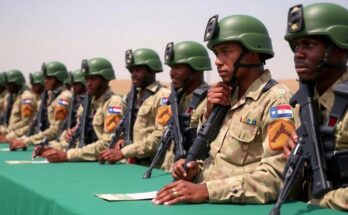Azerbaijan’s President Ilham Aliyev has announced financial support for small island developing states participating in COP29, hinting at underlying geopolitical motives linked to tensions with France over the Nagorno-Karabakh conflict. Aliyev’s initiative is intended to garner influence while also addressing climate change concerns from these vulnerable nations. The announcement follows a series of confrontations with French President Macron, highlighting the intricate connection between environmental discussions and international political rivalries.
The forthcoming COP29 climate conference, scheduled to be held in Baku in November, is increasingly becoming a stage for geopolitical maneuvering, particularly by Azerbaijani President Ilham Aliyev. In a bid to enhance Azerbaijan’s influence and offset French positions, Aliyev has pledged financial assistance to small island developing states (SIDS), particularly those with French ties. This initiative, which includes funding for airfare, accommodation, and per diems for delegates from these island nations, appears to be a strategic move that also aims to draw attention to Aliyev’s grievances with France. The Azerbaijani leadership frames this funding initiative as an altruistic endeavor, articulated by Ecology Minister Mukhtar Babayev, who stresses the necessity of including perspectives from small island nations affected by climate change. However, the backdrop of ongoing tensions between Azerbaijan and France complicates this narrative. The relationship has grown contentious due to differing support regarding the Nagorno-Karabakh conflict, with France maintaining a supportive stance toward Armenia. Following Aliyev’s military successes in the region, his administration has increasingly criticized France, branding it as engaging in “neo-colonial” practices in the Pacific. Moreover, the initiative aligns with Azerbaijan’s broader aims to position itself as a champion of climate action while simultaneously undermining French interests within the context of international negotiations. The tension reached new heights during the UN General Assembly, where President Macron reiterated France’s commitment to Armenia, to which Azerbaijan’s government responded by denouncing France’s involvement as counterproductive. This juxtaposition portrays the climate conference not merely as an environmental platform but also as a geopolitical battleground for regional influence and strategic relations.
The article outlines the geopolitical dynamics surrounding the COP29 climate conference to be hosted in Baku, Azerbaijan, in November. President Ilham Aliyev of Azerbaijan is leveraging the conference as a means to assert influence and challenge the positions of France, particularly given the historical tensions following the Nagorno-Karabakh conflict. The funding for small island developing states, which are disproportionately affected by climate change, is framed as a humanitarian initiative but raises suspicions regarding its timing and underlying motives. The interactions between Azerbaijani and French leaders underscore the complex interplay between climate diplomacy and geopolitical rivalry.
In summary, Azerbaijan’s initiative to fund participation for small island developing countries at COP29 is a multifaceted effort that seeks to amplify the voices of vulnerable states while simultaneously serving as a vehicle for Azerbaijan to express its opposition to French policies. By intertwining humanitarian assistance with geopolitical strategy, Aliyev’s government aims to reshape narratives surrounding both climate action and Azerbaijan’s role on the global stage. The COP29 conference thus may not only spotlight crucial environmental issues but also serve as a backdrop for broader geopolitical challenges.
Original Source: eurasianet.org




